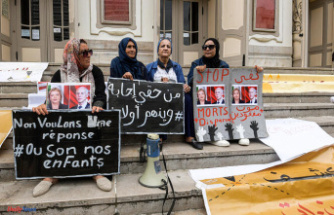Two and a half years before the next general election, the taunts in the Hamburg Senate are noticeably increasing - the climate between red and green has become more irritated. Senators are at odds with senators, and even Mayor Peter Tschentscher (SPD) is exploring where the coalition partner's pain threshold lies when he publicly considers building wind turbines in nature reserves. A statement with obviously calculated indignation.
The SPD and the Greens do not hide the fact that Hamburg was an alliance of convenience from the outset. There are few partnership appointments, for example by Tschentscher and the second mayor Katharina Fegebank (Greens), just as little as "a story that both parties want to tell together", as the town hall says.
Instead, the motto is "close your eyes and go through it!", "extend your elbows from time to time", "if necessary against the line agreed in the Senate" - all this on the way to the district elections in 2024, followed by the state elections in 2025. That SPD and Greens in Hamburg are each other's biggest competitors in the battle for voters' favour, the situation is aggravated. A look at the government's areas of tension.
Whether it's the harbor silt, the import terminal for LNG natural gas or the Moorburg power plant - Hamburg's independent Economics Senator Michael Westhagemann and Jens Kerstan (Greens), who is responsible for the environment and energy, keep clashing, especially on issues that are fundamental to Hamburg's economy and infrastructure are important.
In autumn 2020, Westhagemann presented a concept for the disposal of harbor and Elbe silt near the - uninhabited and belonging to Hamburg - Scharhörn island in the German Bight off Neuwerk. The Hamburg sea area borders on the Hamburg Wadden Sea National Park. From the point of view of the environmental associations BUND, Nabu and WWF, dumping of sediment there was and is impossible.
Westhagemann brought the plan into play in coordination with the Hamburg Port Authority (HPA) because the problem of siltation is becoming more and more urgent. Kerstan's authorities immediately demanded that the environmental organizations be closely involved, knowing full well that they would not agree to such a concept. The result: Schlick will probably not be dumped at this location.
When it came to the application for a floating LNG import terminal this spring, Kerstan's energy authority signaled interest in such a ship for the residents of the disused Moorburg coal-fired power plant. "No other floating LNG import terminal would be so close to the existing natural gas network in Germany, neither in Stade nor in Wilhelmshaven or Brunsbüttel," Kerstan told WELT in May.
Westhagemann criticized this project from the start, first behind the scenes and then publicly. An LNG terminal in the middle of the port of Hamburg will have an unacceptable impact on its operations. It is also unclear where the 500,000 to 700,000 cubic meters of dredged material that would result from deepening the necessary berth should be taken to. "I made my concerns clear from the start, and I'll stick to that," Westhagemann recently told this newspaper.
In the same interview, the Senator for Economic Affairs suggested that the decommissioned Moorburg coal-fired power plant should be temporarily continued to operate in order to better secure the energy supply for Hamburg's economy - in the event that Russian natural gas was no longer supplied or no longer reliably supplied.
The use of natural gas in industry can be partially replaced by electricity-powered systems: “But that only makes sense if the power supply is guaranteed.” Since Vattenfall does not want to reactivate the power plant, another operator could also be considered, “up to federal intervention". Kerstan countered sharply and personally: “Technically and in view of the high costs, restarting the system would be equivalent to a new building and is therefore out of the question. Senator Westhagemann should actually know that.”
In order to promote climate protection, Mayor Tschentscher would like to build wind turbines exactly where it usually only hums, hums, grows and thrives - in nature reserves. The consideration alone, which the head of government expressed at the beginning of July, already triggered a stimulus effect in Kerstan, who was dubbed the "gut person".
Of course, Tschentscher's idea has to do with the problematic situation in which Germany finds itself due to climate change and skyrocketing energy prices. The fact that he has already looked out for possible areas with the port administration HPA and the planning staff has also heated up the minds of the Greens. While Tschentscher would like to at least double the existing wind energy in the port with the expansion, Kerstan had his authority surprisingly taciturnly informed that wind turbines in nature protection areas are not permitted under the Federal Nature Conservation Act.
Nature reserves are the most strictly protected natural areas in Hamburg. However, landscape protection areas are less strictly protected. And so the Federal Ministry of Economics and Climate Protection is currently preparing a legislative initiative with the Federal Ministry for Environmental Protection that will enable wind turbines in landscape protection areas.
Twenty percent of Hamburg's state area counts as landscape protection areas, and nature reserves make up another ten percent. From the mayor's point of view, wind energy and nature conservation are very compatible, after all, climate protection is an overarching goal that must be vigorously pursued. A comrade adds: "What is legally possible will be examined, regardless of ideology."
The coalition partners do not always agree on the subject of transport either. The Greens recently made it clear that they would like to support the initiative for more 30 km/h, just like Berlin, Frankfurt, Cologne and Hanover do. So far, cities and municipalities have only been allowed to impose a 30 km/h speed limit on main roads in exceptional cases – for example in front of schools or at night for noise protection. The initiative, on the other hand, wants cities to be able to introduce 30 km/h wherever they consider it necessary.
But when the left wanted to ask the Senate to join this initiative with a motion, the Greens – together with the SPD – voted against it. It is no secret that "this is a point where we are arguing in the coalition," said the Green Rosa Domm in the Transport Committee. The otherwise eloquent Transport Senator Anjes Tjarks (Greens) was tight-lipped and referred to the decision of the committee. In response to parliamentary questions, it was only said that the Senate did not comment on "internal opinion-forming".
There is another dispute over resident parking. The SPD and the Greens had written 20 additional resident parking zones by 2025 in the joint coalition agreement. Halfway through, the number had long since been exceeded by 50 percent, and a further dozen resident parking zones are to be added in the short term. The zones are primarily intended to help residents not have to search long for parking spaces, but Transport Senator Tjarks says he also wants to use this as an incentive for non-residents to switch to buses, trains or bicycles.
So far, the SPD has been involved. After Tjarks promised relief for craftsmen and shift workers, the coalition peace seemed completely safe. But recently SPD faction leader Dirk Kienscherf pushed ahead and called for far-reaching changes in resident parking. He quickly tried to make it clear that he was "in good talks" with the traffic authority. Nevertheless, the new proposals came across as an attack on the parking policy, which until now has largely been left to the Green coalition partner.












